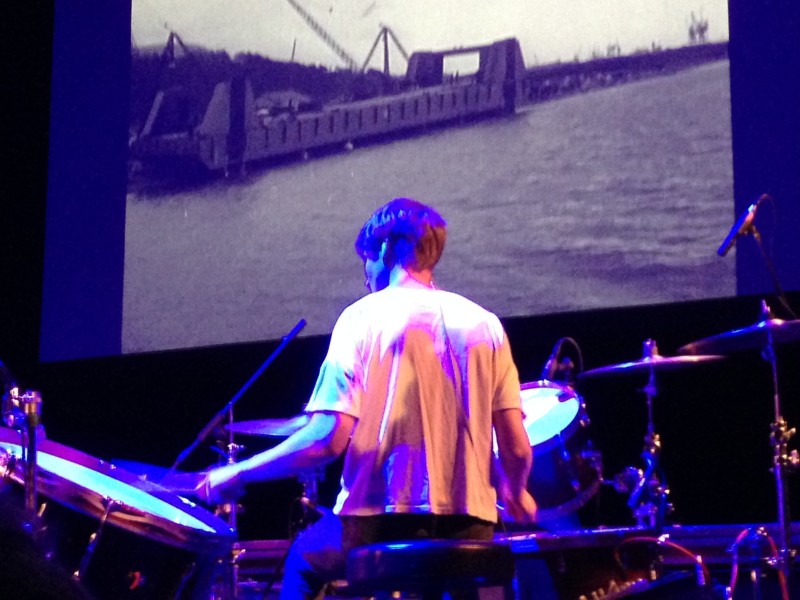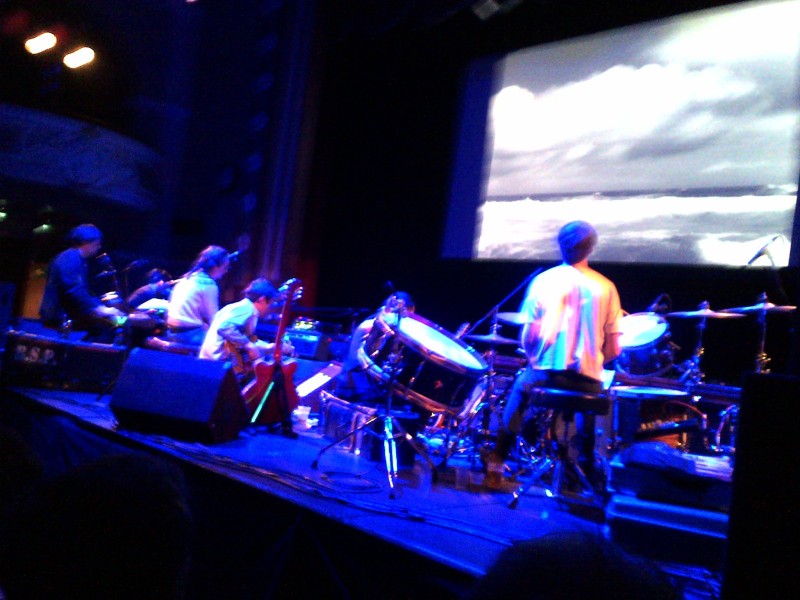Met up with a bunch of pals to see British Sea Power play the soundtrack to ‘From the Sea to the Land Beyond’ live as part of the Ilkley Film Festival (Ilkley doesn’t have a cinema yet but I’m sure this will get the locals galvanised). What a great noise they make, full of energy and pathos which beautifully matched the Great British seaside scenes on view. As a BSP newbie I didn’t feel I could do this justice so Mark stepped into the breach………
In the interests of full disclosure, I should say now this isn’t an unbiased review of British Sea Power’s performance of From The Sea To The Land Beyond at the King George’s Hall in Ilkley. I’m a fan, I’ve seen them dozens of times, usually in the company of people who’ve seen them hundreds of times (that’s not an exaggeration). It’s the whole package that appeals; of course there’s their music, which can vary from flag-waving indie rock anthems to epic excursions into post rock that would have Sigur Ros looking at their crown, to folk-like sea shanties or scrappy garage punk thrash…usually snuggling up against each other on the same LP. But on top of that there’s an image and an attitude of cheerful dissent, more in common the mass trespass on Kinder Scout that your usual bleeding heart leftie musicians. The gigs are true performances, the band giving their all, often ending up in the crowd or scaling the balconies, foliage, flags and plastic birds decorating the stage and the bears geeing the crowd up – not that your average British Sea Power audience needs much encouragement. And then there’s the merchandise; they’re on their 14th mug design, lord alone knows how many t-shirts they’ve come up with, all of which is pretty standard to most bands – but their own beer, long before Iron Maiden & Elbow came in on the act? Tea? Kendal mint cake! Soap!! Some very nice xmas cards a couple of years back, too.

So it might be considered normal that a band who formed around the turn of the century and released their first LP (the self-effacingly titled The Decline Of British Sea Power) a little over 10 years ago would put out a best of around now. But this is British Sea Power, so normal goes out the window. Those not-quite hits, live favourites and a couple of obscurities that anyone else would package up and sling out as an xmas cash-in have instead been lovingly and quite radically rearranged into a largely instrumental soundtrack for the film we gathered here to watch From The Sea To The Land Beyond. The title comes from the British Sea Power song, The Land Beyond. The film itself…well, one more thing about British Sea Power first. This isn’t their usual crowd, though some of the more dedicated have travelled from the wilds of Lincolnshire to be here. No, this is definitely more the Ilkley Film Festival’s audience, gathered in what is basically a glorified church hall dedicated to beard hero George V, who’s glowering down at us from above the stage. It’s more used to the Sooty Show and 60s revival bands than art-rock and experimental film…
From The Sea To The Land Beyond is part of a trend to raid the British Film Institute and similar organisations’ archives for the 100 years or so of historical footage in them and bring it together into a unified piece of cinema, with little or no narration, simply allowing the images and music to speak for themselves. Recycling the past? Perhaps. Similar efforts include Bill Morrison’s bleak meditation on the rise & fall of the British coal industry, The Miners’ Hymns. That’s accompanied by a suitably mournful brass-led soundtrack by Icelandic composer Johann Johannson. There’s also Song From The Shipyards (substitute shipbuilding for coal), a less successful film but with music by The Unthanks, so that more than makes up for any disappointment on screen.
Where From The Sea To The Land Beyond differs from these is that it doesn’t try to create a narrative from the archive material. Instead, there’s a broadly chronological sweep across the last century or so to create an impression of the British relationship with the sea. Themes of work & play, destruction and creation are the anchors which hold it all together. Fishing and shipbuilding feature, as do scenes of cargo being shipped around the world; this contrasts to hordes of people in their Sunday best gathering in Blackpool (and it’s always Blackpool) for fun & frolics, whether it’s 1912, 1952 or 2012. But some of those jolly games are between soldiers, shortly to be shipped off to the First World War, giving a sinister edge to the horseplay.
If you’re into film, or history, then you’re very likely going to love this. That’s without considering the gorgeous British Sea Power soundtrack, either recorded or as we have it here, performed in front of us, the band with backs to the audience, staring intently at the screen for visual cues. As mentioned, these are all previously released songs, but with the vocals mostly stripped away & carefully reworked to compliment the images on screen. The only times when a film slips up is when it tries to make a political point. During scenes of Commonwealth troops landing in Britain after World War Two, a plummy Pathe newsreel voiceover reminds the viewers in 1945 & 2014 what a debt we owe them; as if to emphasize this, British Sea Power bring a snatch of the original lyrics back…’and we’re not going home…’ either as a celebration of cultural diversity or a dire warning (I’m going with the former). There’s also the counterpoint of the frankly ridiculous uniforms & hairstyles of the City traders who moved into London’s Docklands when the docks were no longer needed, with that of the dockers who once worked there. It’s as if Penny Woolcock, the director, is trying to hammer home which of these groups of workers added any real value…I think we know which it is.

These minor points aside, From The Sea To The Land Beyond is a beautiful piece of cinema, continually returning to the central theme of what British Sea Power themselves sang about on their classic single, Carrion; ‘always, always, always the sea’. All the more poignant perhaps, considering the continuing storms ravaging the south coast. There’s a blink & you miss it moment where happy holidaymakers in the 1930s are being shipped to the beaches of the South West on the Cornish Riviera train; it crosses Dawlish Warren, along the section of track that as of a couple of weeks ago, isn’t there any longer.
If you want to see what British Sea Power look like stood up & facing the crowd, their Easter tour brings them to York, Holmfirth and Sheffield. I hope to see you there.
Mark Pomroy

